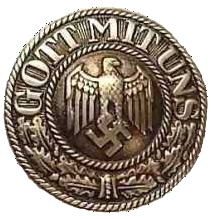The fact that we had chosen red as the colour for our posters sufficed to attract them to our meetings. The ordinary bourgeoisie were very shocked to see that, we had also chosen the symbolic red of Bolshevism and they regarded this as something ambiguously significant. The suspicion was whispered in German Nationalist circles that we also were merely another variety of Marxism, perhaps even Marxists suitably disguised, or better still, Socialists. The actual difference between Socialism and Marxism still remains a mystery to these people up to this day. The charge of Marxism was conclusively proved when it was discovered that at our meetings we deliberately substituted the words 'Fellow-countrymen and Women' for 'Ladies and Gentlemen' and addressed each other as 'Party Comrade'. We used to roar with laughter at these silly faint-hearted bourgeoisie and their efforts to puzzle out our origin, our intentions and our aims.
We chose red for our posters after particular and careful deliberation, our intention being to irritate the Left, so as to arouse their attention and tempt them to come to our meetings--if only in order to break them up--so that in this way we got a chance of talking to the people.
In those years it was indeed a delightful experience to follow the constantly changing tactics of our perplexed and helpless adversaries. First of all they appealed to their followers to ignore us and keep away from our meetings. Generally speaking this appeal was heeded. But, as time went on, more and more of their followers gradually found their way to us and accepted our teaching. Then the leaders became nervous and uneasy. They clung to their belief that such a development should not be ignored for ever, and that terror must be applied in order to put an end to it.
Appeals were then made to the 'class-conscious proletariat' to attend our meetings in masses and strike with the clenched hand of the proletarian at the representatives of a 'monarchist and reactionary agitation'.
Our meetings suddenly became packed with work-people fully three-quarters of an hour before the proceedings were scheduled to begin. These gatherings resembled a powder cask ready to explode at any moment; and the fuse was conveniently at hand. But matters always turned out differently. People came as enemies and left, not perhaps prepared to join us, yet in a reflective mood and disposed critically to examine the correctness of their own doctrine. Gradually as time went on my three-hour lectures resulted in supporters and opponents becoming united in one single enthusiastic group of people. Every signal for the breaking-up of the meeting failed. The result was that the opposition leaders became frightened and once again looked for help to those quarters that had formerly discountenanced these tactics and, with some show of right, had been of the opinion that on principle the workers should be forbidden to attend our meetings.
Then they did not come any more, or only in small numbers. But after a short time the whole game started all over again. The instructions to keep away from us were ignored; the comrades came in steadily increasing numbers, until finally the advocates of the radical tactics won the day. We were to be broken up.
Yet when, after two, three and even eight meetings, it was realized that to break up these gatherings was easier said than done and that every meeting resulted in a decisive weakening of the red fighting forces, then suddenly the other password was introduced: 'Proletarians, comrades and comradesses, avoid meetings of the National Socialist agitators'.
The same eternally alternating tactics were also to be observed in the Red Press. Soon they tried to silence us but discovered the uselessness of such an attempt. After that they swung round to the opposite tactics. Daily 'reference' was made to us solely for the purpose of absolutely ridiculing us in the eyes of the working-classes. After a time these gentlemen must have felt that no harm was being done to us, but that, on the contrary, we were reaping an advantage in that people were asking themselves why so much space was being devoted to a subject which was supposed to be so ludicrous. People became curious. Suddenly there














